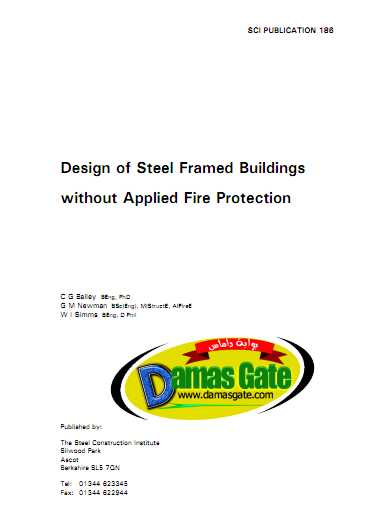Design of Steel Buildings without Fire Protection
Fire safety is an important consideration in the design of multi-storey buildings
and this publication describes ways of achieving the necessary levels of safety
without the use of applied fire protection. According to the Regulations, the
elements of structure of most moderate sized offices require 60 minutes fire
resistance when tested in a standard fire resistance test, whilst those in two storey
offices normally require only 30 minutes fire resistance. The fire resistance
requirements for buildings in the UK are specified in The Building Regulations.

INTRODUCTION
The requirements vary, up to 240 minutes, depending on the building height, size and use.
In most modern steel framed buildings, the members would typically be protected
from the effects of fire by spray or board protection, or intumescent coatings.
These methods have proven more economical than the more traditional approach
of encasing the steel in concrete or masonry.
The required amount of protection to steel frames is dependent on the type of
member, its shape and the fire resistance to be achieved. However, The Building
Regulations do not specify that a structure must have fire protection, only that it
must have fire resistance. This is an important distinction, as many types of steel
members can economically achieve up to 60 minutes fire resistance without
requiring applied fire protection.
At the design stage, most designers do not consider the method of protecting steel
structures from the effects of fire. It is common practice for fire protection to be
regarded as a finish, consequently, the normal sequence is to design, construct and
then fire protect. However, through the influence of BS 5950-8:1990
, advances
have been made, which offer an alternative approach. This involves the use of
fire engineering design which is a more rational rather than prescriptive approach.
Fire engineering design methods may impose some limitations, but have the
advantage of largely eliminating the fire protection trade from site, which can lead
to significant economies and take the fire protection activity off the critical path.
As approximately 80% of steel framed buildings require 60 minutes or less fire
resistance, the scope for application of these methods in practice is appreciable.
In this publication, methods of designing and constructing steel framed buildings
for 30 and 60 minutes fire resistance without applied fire protection are described.
In most instances the structural configurations presented in this guide are covered
by design codes of practice and design guides published by The Steel Construction
Institute or other organisations. Only a summary of the design procedures are
thus included, and the reader is directed towards more specialised documents for
detailed guidance.
Download
*